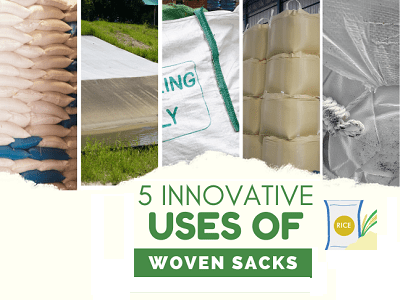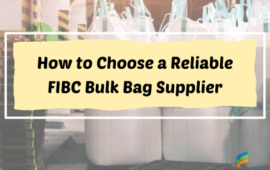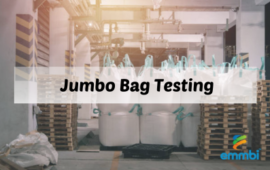Woven sacks have long been an essential part of the packaging and transportation industries worldwide. However, their versatile nature has led to innovative applications beyond traditional uses. In the USA, Emmbi Industries has pioneered the exploration of woven sacks, unlocking their potential in various sectors. This article delves into five unique uses of woven sacks in the USA and highlights the contributions of Emmbi Industries in transforming these everyday products into extraordinary solutions.
What is a Woven Bag?
Woven bags, also known as woven sacks, are durable containers made from woven polypropylene or high-density polyethylene (HDPE) fabric. They are crafted using a weaving technique that results in a strong, tear-resistant material. Woven sacks are known by different names such as woven polypropylene bags, pp-woven sacks or polypropylene woven sacks.
What are Woven Sacks Made Of?
Woven sacks are primarily manufactured using polypropylene and HDPE materials. Polypropylene, a versatile thermoplastic polymer, is lightweight, resistant to moisture, and offers excellent strength and durability. HDPE, on the other hand, provides enhanced rigidity and resistance to chemicals and UV radiation. Understanding these materials is crucial for exploring their innovative uses.
Agricultural Product Packaging: Utilizing Woven Sacks for Efficient Storage and Transportation:
Agriculture Product Packaging Woven sacks have found remarkable applications in agriculture product packaging. With their strength and breathability, they are ideal for storing and transporting crops, seeds, fertilizers, and animal feed. The woven structure allows air circulation, preventing moisture build-up and maintaining the quality of agricultural products. Moreover, their lightweight nature reduces transportation costs and facilitates easy handling.
Food Packaging Solutions: Harnessing the Benefits of Woven Sacks for Fresh and Efficient Storage
Food Packaging In the food industry, woven sacks have proven invaluable for packaging various products. From grains and flour to fruits and vegetables, woven bags offer protection against external elements while allowing proper ventilation. The permeability of the fabric ensures the freshness and quality of perishable items, making them suitable for bulk storage and transportation.
Geotechnical Engineering Solutions: Woven Sacks for Erosion Control and Slope Stabilization:
Geotechnical Engineering Woven sacks have also found applications in geotechnical engineering. Their robust construction and permeability make them suitable for erosion control, slope stabilization, and landscaping projects. Woven sacks filled with soil, sand, or rocks create retaining structures that prevent soil erosion and offer stability in areas prone to landslides. This innovative use showcases the adaptability of woven sacks beyond traditional packaging.
Flood Control Solutions: Woven Sacks for Effective Barrier and Protection:
Flood Control Products Woven sacks have emerged as essential tools in flood control measures. By filling them with sand or gravel, they become effective barriers for flood protection. These sandbags, made from woven polypropylene fabric, can be easily stacked to create temporary or permanent structures that redirect and contain floodwaters. Their affordability and ease of deployment make them invaluable during emergency situations.
Sustainable Travel Solutions: Woven Sacks as Eco-Friendly Beach Bags and Luggage:
Tourism and Transport Woven sacks have even found applications in the tourism and transport sectors. They are used for making durable, lightweight, and eco-friendly beach bags, tote bags, and luggage. Woven sacks offer an alternative to conventional synthetic materials, reducing environmental impact while maintaining functionality and style. Their versatility in design and customization options make them popular choices among environmentally conscious travelers.
The Benefits of Woven Bag
To fully grasp the significance of these innovative uses, it is important to understand the benefits of specific types of woven bags, such as woven polypropylene bags and HDPE woven sacks.
Woven polypropylene bags are renowned for their exceptional strength, tear resistance, and flexibility. They are widely used in industries that require heavy-duty packaging, such as construction, agriculture, and industrial sectors. These bags provide superior protection against moisture, UV radiation, and harsh weather conditions, ensuring the integrity of the contents.
HDPE woven sacks, on the other hand, offer excellent rigidity and resistance to chemicals. They are commonly used for packaging chemicals, fertilizers, and hazardous materials. The inherent properties of HDPE woven sacks make them ideal for industries where stringent safety requirements must be met.
The Future of Woven Sacks in the USA
Based on web search results, the global woven bags market was valued at around US$ 5.8 Billion in 2021 and is projected to increase at a steady CAGR of 4.3% and top a valuation of US$ 9.2 Billion by 2032. In 2021, the USA woven bags market grew by 3.6% year on year and across North America, total sales of woven bags are estimated to reach US$ 1 Billion by 2022. The significant growth in the trade of chemicals in the USA will create demand for woven bags in near future. Based on these facts it is predicted that the USA woven bags market will create an incremental opportunity of US$ 460 Million, by the end of 2032.
FAQs
What is a woven bag called?
A woven bag is commonly called a polypropylene sack or PP woven bag due to its material and construction.
What material is used for sacks?
Sacks are typically made of sacking, a closely-woven fabric made of jute or hemp.
What is a woven shopping bag?
A woven shopping bag is a durable, waterproof bag made from interwoven polypropylene fabric strips.
Are woven bags waterproof?
Yes, woven bags can be waterproof, but it’s important to compare them with non-woven bags based on your specific needs.
Is woven bag biodegradable?
No, woven bags are made from polypropylene polymer and are not biodegradable, but they can be reused.




